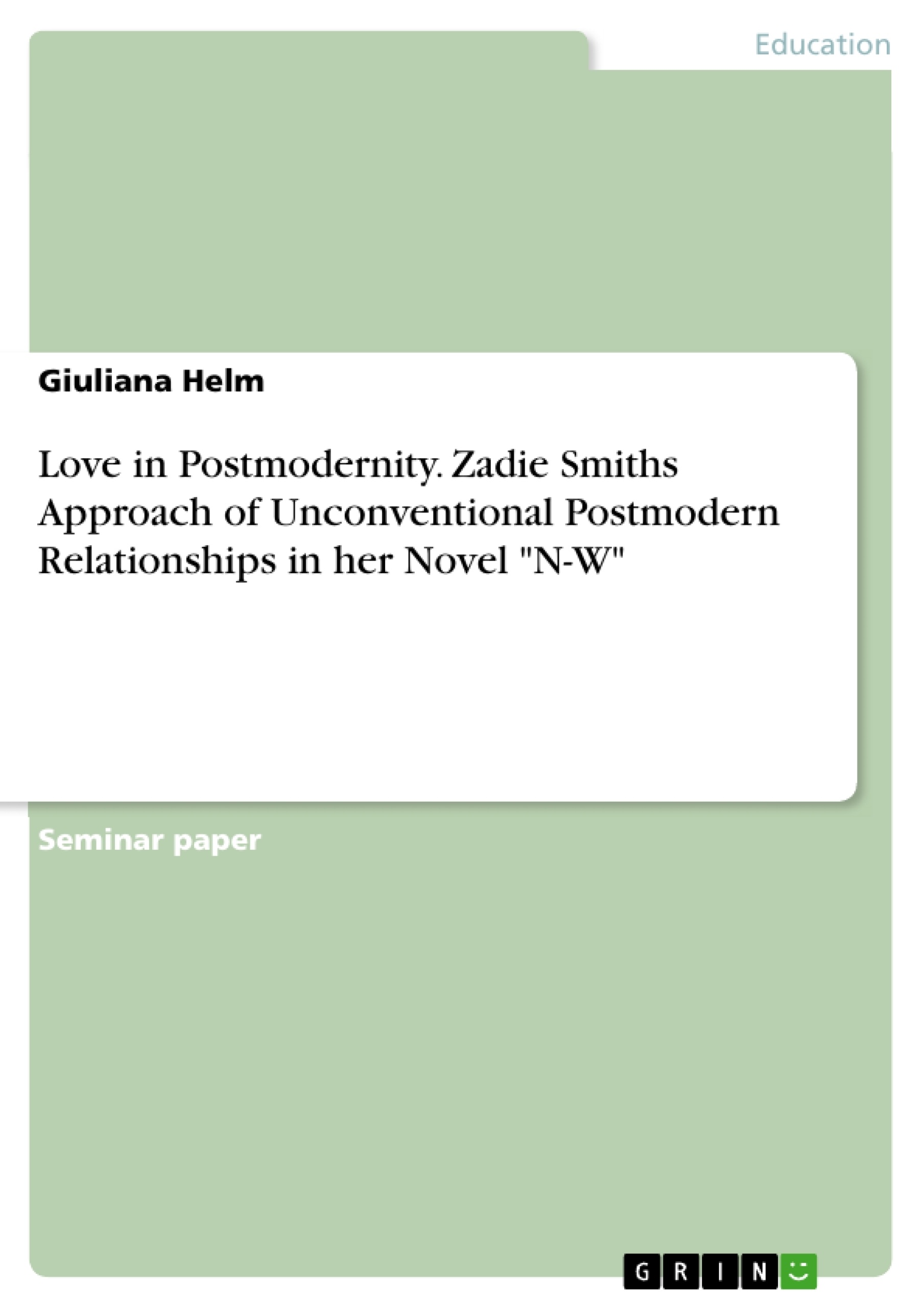Love is commonly known as the indescribable passion between two people who found each other and are planning to stay together forever. But the modernised divorce system and such hardships as finances have created the impression that the romantic idea of love has faded the last decades. This phenomenon engages not only sociologists but also authors who are giving thoughts to those developments in their literally works and therefore explore the reasons of such developments associated with postmodern pair-relationships.
The high divorce rates are one of the major results of a change in pair-relationships in the western society and the attitudes towards the different manners against having a relationship changed drastically throughout the last century. So postmodernity is the time for free experimentation, diversity, the time of myriads of possibilities, and the time where people respect the choice of the single individual for individualisation and self-development.
A lot of people take those many featured chances and explore as much as they can, not only according to their economic possibilities, but also according to their private way of life in their relationships. They grant themselves every personal freedom, the highest profits, and put themselves before anything else. As an effect people are opposed more openly to serial relationships. On the one hand they are trying to compensate their mistakes of their previous partners and are learning to distinguish between what they want and don ́t want. On the other hand they live their live as they please not really bearing in mind that the fast change in social values distracts them from their original wish of not spending their live alone when they get old.
But according to pair-relationships, this lifestyle does not always end well and never before were the divorce rates in Britain as high as in postmodern times. So the question emerges, if in the end it is possible to remain in the state of happiness in a relationship or if passionate love gives space to individual desires supported by the patterns of contemporary unconventional relationships.
Inhaltsverzeichnis (Table of Contents)
- The Difficulties in Achieving Happiness in Postmodernity.
- N-W and the Variation of Postmodern Relationship Concepts
- Different Concepts of Postmodern Relationships
- The Tree Pillars of Unconventional Relationships: Individualisation, Self-development, Intimacy, and Sexuality
- Zadie Smith's Approach to Unconventional Relationships
Centred in her Novel N-W
- The Integration of Intimacy Through the Character of Leah Hanwell
- Natalie Blake Representing Self-development and Individualisation
- Felix Cooper and Postmodern Promiscuity.
- Postmodernity and the Absence of Happiness in Marriages
Zielsetzung und Themenschwerpunkte (Objectives and Key Themes)
This term paper aims to explore the complexities of love and relationships in postmodernity, using Zadie Smith's novel "N-W" as a case study. It will analyze how Smith's approach to unconventional relationship models reflects broader societal trends and challenges in contemporary relationships.
- The impact of postmodern values like individualization and self-development on relationships
- The evolution of unconventional relationships in contemporary society
- The challenges and complexities of achieving happiness and fulfillment in postmodern relationships
- The role of intimacy, sexuality, and self-expression in shaping unconventional relationships
- The novel's exploration of the shifting dynamics of love, commitment, and monogamy in the postmodern era
Zusammenfassung der Kapitel (Chapter Summaries)
The first chapter provides an overview of the complexities of achieving happiness in postmodern relationships. It highlights the impact of societal trends like the high divorce rate on the traditional understanding of love and commitment. The second chapter delves into the diverse landscape of postmodern relationship concepts, contrasting conventional and unconventional models. It explores various forms of unconventional relationships, including extra-marital cohabitation, pluralisation, and polygamous relationships. The chapter also discusses the increasing prevalence of casual sexual relationships and their impact on intimacy and commitment.
Schlüsselwörter (Keywords)
The main keywords of this work are postmodern relationships, unconventional relationships, individualization, self-development, intimacy, sexuality, and happiness. It explores these concepts in the context of Zadie Smith's novel "N-W" and contemporary societal trends. Further key aspects include the analysis of specific character behaviors within the novel and their reflection of broader sociological patterns.
Frequently Asked Questions about Zadie Smith's "NW"
How does Zadie Smith's novel "NW" approach postmodern love?
The novel explores unconventional relationship models, highlighting the shift from traditional romantic ideals to individualization and self-development.
What are the "three pillars" of unconventional relationships mentioned?
The pillars are individualization, self-development, and a focus on intimacy and sexuality over traditional commitment.
What does the character Leah Hanwell represent?
Leah Hanwell represents the integration of intimacy and the struggles of maintaining connection within postmodern relationship dynamics.
Why are divorce rates so high in postmodernity according to the text?
High divorce rates are seen as a result of the priority given to individual freedom, economic possibilities, and the fast change in social values.
What is "postmodern promiscuity" in the context of the novel?
It refers to the trend of serial relationships and casual sexual encounters as a way to explore personal desires before committing to long-term partners.
- Quote paper
- Giuliana Helm (Author), 2013, Love in Postmodernity. Zadie Smiths Approach of Unconventional Postmodern Relationships in her Novel "N-W", Munich, GRIN Verlag, https://www.grin.com/document/304099



